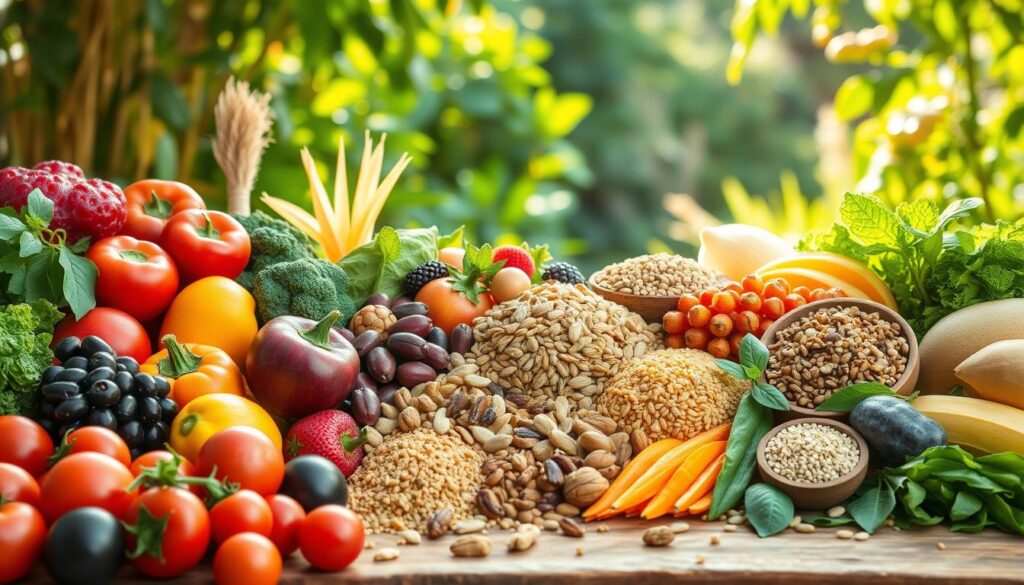Are you curious about the transformative power of a plant-based diet on your overall well-being? As the world shifts towards healthier eating habits, many are discovering the profound impact of a diet rich in fruits, vegetables, and whole grains.
Adopting a plant-based lifestyle can be a game-changer, offering numerous benefits that can enhance your health and vitality. But what exactly can you expect from making this significant change?
By embracing a diet centered around whole, nutrient-dense foods, you can unlock a wealth of advantages that contribute to a healthier, more balanced you.
Key Takeaways
Table of Contents
- Discover the core principles of a plant-based diet
- Learn how a plant-based lifestyle can boost your overall health
- Explore the benefits of a diet rich in fruits, vegetables, and whole grains
- Understand how to make a successful transition to a plant-based diet
- Find out how a plant-based diet can enhance your vitality and well-being
What Is a Plant-Based Diet?
The concept of a plant-based diet has gained popularity, but what does it really mean? At its core, a plant-based diet focuses on foods derived from plants, including fruits, vegetables, grains, and legumes, minimizing or entirely excluding animal products.
Plant-Based vs. Vegan vs. Vegetarian
While often used interchangeably, plant-based, vegan, and vegetarian diets have distinct differences. A vegan diet excludes all animal products, including dairy and eggs, whereas a vegetarian diet may include dairy and eggs but excludes meat. A plant-based diet primarily focuses on plant foods but may occasionally include small amounts of animal products.
The Spectrum of Plant-Based Eating
Plant-based eating exists on a spectrum, ranging from flexitarian, which includes occasional consumption of meat, to fully plant-based, where all animal products are avoided. Understanding this spectrum is crucial for individuals looking to adopt a plant-based lifestyle, as it allows for a more personalized and sustainable approach.
Benefits of a Plant-Based Diet for Overall Health
Adopting a plant-based diet can be a transformative step towards achieving optimal health and wellbeing. By focusing on whole, nutrient-dense plant foods, individuals can experience a wide range of health benefits.
Improved Heart Health and Blood Pressure
A plant-based diet is known to support heart health by reducing the risk of heart disease and lowering blood pressure. This is largely due to the high levels of fiber, vitamins, and minerals found in plant foods, which help to keep arteries flexible and healthy.
Weight Management and Metabolic Health
Plant-based diets tend to be high in fiber and low in saturated fats, making them effective for weight management and improving metabolic health. By emphasizing whole grains, fruits, and vegetables, individuals can maintain a healthy weight and reduce the risk of metabolic syndrome.
Reduced Inflammation and Chronic Disease Risk
A diet rich in plant-based foods can help reduce inflammation in the body, which is associated with a lower risk of chronic diseases such as diabetes, certain cancers, and cardiovascular disease. Antioxidants and polyphenols found in plants play a key role in this anti-inflammatory effect.
Enhanced Digestive Health and Gut Microbiome
The high fiber content of a plant-based diet supports a healthy gut microbiome, promoting digestive health and boosting the immune system. A diverse gut microbiota is crucial for overall health, influencing everything from nutrient absorption to mental wellbeing.
| Health Benefit | Description |
|---|---|
| Improved Heart Health | Lower risk of heart disease and reduced blood pressure |
| Weight Management | Effective for maintaining a healthy weight |
| Reduced Inflammation | Lower risk of chronic diseases like diabetes and certain cancers |
| Enhanced Digestive Health | Supports a healthy gut microbiome and immune system |
Embracing a plant-based diet is not just about avoiding certain foods; it’s about adopting a comprehensive approach to nutrition that fosters overall health and wellbeing. By incorporating a variety of plant-based foods into your diet, you can reap the numerous benefits associated with this eating pattern.
How to Transition to a Plant-Based Diet Successfully
A successful transition to a plant-based diet starts with understanding your current eating habits and setting realistic goals. This journey is not just about changing your diet; it’s about adopting a healthier lifestyle that can have a significant impact on your overall health and wellbeing.
Step 1: Assess Your Current Eating Habits
Begin by keeping a food diary to track what you eat for a week or two. This will help you identify patterns, favorite foods, and areas where you can make plant-based swaps. Understanding your current habits is crucial for making a smooth transition.
Step 2: Set Achievable Goals and Pace Yourself
Setting realistic goals is key to a successful transition. Decide on a timeline that works for you, whether it’s replacing one meal a day with a plant-based option or dedicating certain days of the week to plant-based eating. Patience is crucial as your taste preferences and digestive system adjust.
Step 3: Start with Plant-Based Swaps
Begin by substituting animal products with plant-based alternatives. This can include dairy alternatives, meat alternatives, and egg replacements.
Dairy Alternatives
Options like almond milk, soy milk, and oat milk can easily replace cow’s milk in recipes and cereal. Consider brands that are fortified with calcium and vitamins.
Meat Alternatives
Tofu, tempeh, and seitan are versatile protein sources that can be used in a variety of dishes. Look for plant-based burgers and sausages made from ingredients like mushrooms, lentils, or chickpeas.
Egg Replacements
For baking, flaxseed meal mixed with water or mashed banana can serve as effective egg substitutes. Commercial egg replacers are also available.
Step 4: Build Your Plant-Based Pantry
Stocking your pantry with the right staples can make cooking plant-based meals easier and more enjoyable.
Essential Staples
Whole grains like quinoa, brown rice, and whole wheat pasta are nutritious bases for meals. Canned beans, lentils, and a variety of spices can add flavor and protein.
Time-Saving Convenience Foods
Pre-cut vegetables, canned tomatoes, and pre-cooked lentils can save time during meal prep. Nut butters and hummus are quick sources of healthy fats and protein.
| Food Category | Examples | Benefits |
|---|---|---|
| Whole Grains | Quinoa, Brown Rice, Whole Wheat Pasta | Rich in Fiber, Vitamins, and Minerals |
| Protein Sources | Tofu, Tempeh, Lentils, Chickpeas | High in Protein, Versatile in Recipes |
| Dairy Alternatives | Almond Milk, Soy Milk, Oat Milk | Lower in Calories, Fortified with Calcium |
Transitioning to a plant-based diet is a journey that not only benefits your health but also contributes to a more sustainable lifestyle. By following these steps and being mindful of your progress, you can enjoy the numerous benefits associated with plant-based diet and wellness.
Creating Balanced and Nutritious Plant-Based Meals
A well-planned plant-based diet is the cornerstone of optimal health, providing the body with the necessary nutrients and energy. To achieve this, it’s essential to understand the components of a balanced meal and how to incorporate a variety of nutrient-dense foods.
The Plant-Based Plate Formula
The Plant-Based Plate Formula is a simple and effective way to ensure you’re getting a balanced mix of nutrients in your meals. It suggests dividing your plate into sections: half for vegetables, a quarter for whole grains, and a quarter for protein-rich foods.
Vegetables should be the star of your meal, providing fiber, vitamins, and minerals. Aim for a variety of colors to maximize nutritional benefits.

Essential Nutrients and Where to Find Them
While a plant-based diet can be rich in many nutrients, there are some key nutrients to pay special attention to.
Protein Sources
Legumes, beans, lentils, tofu, and tempeh are excellent sources of protein. Nuts and seeds, such as almonds and chia seeds, also contribute to your daily protein intake.
Iron, Calcium, and B12
Iron is found in dark leafy greens, beans, and lentils. Calcium is abundant in fortified plant milk, dark leafy greens, and tofu. Vitamin B12, crucial for brain function and blood formation, is primarily found in animal products, so consider supplements or fortified foods.
Omega-3 Fatty Acids
While the most well-known sources of omega-3s are fish and seafood, plant-based sources include flaxseeds, chia seeds, walnuts, and canola oil.
| Nutrient | Plant-Based Sources |
|---|---|
| Protein | Legumes, beans, lentils, tofu, tempeh, nuts, seeds |
| Iron | Dark leafy greens, beans, lentils |
| Calcium | Fortified plant milk, dark leafy greens, tofu |
| Vitamin B12 | Fortified foods, supplements |
| Omega-3 Fatty Acids | Flaxseeds, chia seeds, walnuts, canola oil |
Meal Planning and Prep Strategies
Effective meal planning and preparation are key to maintaining a balanced plant-based diet. This involves setting aside time to plan your meals, make a grocery list, and prep ingredients for the week.
Weekly Prep Routine
Start by planning your meals for the week, considering your schedule and nutritional needs. Make a list of the ingredients you’ll need and shop for them. Then, dedicate a few hours on the weekend to chopping vegetables, cooking grains, and preparing proteins.
Batch Cooking Basics
Batch cooking involves preparing large quantities of a single ingredient or meal that can be used throughout the week. This can include cooking a big batch of lentils or making a large salad that can be portioned out.
By incorporating these strategies into your routine, you can enjoy the benefits of a plant-centric diet, including improved health and well-being.
Mastering Plant-Based Cooking Techniques
Transforming your kitchen into a plant-based haven requires mastering a few essential cooking techniques. With the right methods, you can create delicious, nutritious meals that are both satisfying and healthy.
Flavor-Building Without Animal Products
One of the biggest misconceptions about plant-based cooking is that it’s bland or lacking in flavor. However, there are numerous ways to build rich, complex flavors without using animal products. Using a variety of spices, herbs, and umami-rich ingredients like mushrooms and soy sauce can elevate your dishes.
Umami flavor is particularly important in plant-based cooking, as it adds depth and complexity. Ingredients like miso paste, nutritional yeast, and dried mushrooms are great sources of umami.
Quick and Easy Plant-Based Recipes
Having quick and easy recipes in your repertoire makes maintaining a plant-based diet much simpler. Here are some ideas for different meals:
Breakfast Ideas
Start your day with a nutritious breakfast. Try overnight oats or a veggie scramble with tofu and spices.
Lunch and Dinner Solutions
For lunch or dinner, consider a hearty lentil soup or a quinoa salad with roasted vegetables. These meals are not only quick to prepare but also packed with nutrients.
Snacks and Desserts
For snacks and desserts, fruit smoothies and dark chocolate avocado mousse are delicious and healthy options.
| Meal Type | Recipe Ideas | Key Ingredients |
|---|---|---|
| Breakfast | Overnight oats, Veggie scramble | Oats, tofu, vegetables |
| Lunch/Dinner | Lentil soup, Quinoa salad | Lentils, quinoa, roasted vegetables |
| Snacks/Desserts | Fruit smoothies, Dark chocolate avocado mousse | Fruits, avocado, dark chocolate |
Kitchen Tools That Make Plant-Based Cooking Easier
Having the right kitchen tools can significantly simplify plant-based cooking. Essential tools include a good chef’s knife, a cutting board, and a high-speed blender. These tools help in preparing ingredients and cooking meals efficiently.
Conclusion: Embracing Your Plant-Based Journey
As you’ve discovered, adopting a plant-based diet can have a significant impact on your overall health and wellness. By understanding the benefits of eating plant-based, you’re taking the first step towards a healthier lifestyle.
A plant-based diet and wellness go hand-in-hand, offering numerous benefits, from improved heart health to enhanced digestive well-being. By incorporating more plant-based meals into your diet, you’ll be nourishing your body and supporting a balanced lifestyle.
Now that you’ve learned how to transition to a plant-based diet, create balanced meals, and master plant-based cooking techniques, it’s time to embark on your journey. Start by making small changes and exploring the many delicious and nutritious options available.
By embracing a plant-based lifestyle, you’ll not only improve your health but also contribute to a more sustainable and compassionate world. Take the first step today and discover the benefits of eating plant-based for yourself.
FAQ
What are the benefits of a plant-based diet for overall health?
A plant-based diet offers numerous benefits, including improved heart health, weight management, reduced inflammation, and enhanced digestive health. By incorporating more plant-based meals, individuals can lower their risk of chronic diseases and promote overall wellness.
Is a plant-based diet suitable for everyone, including athletes and individuals with specific dietary needs?
Yes, a well-planned plant-based diet can be suitable for everyone, including athletes and individuals with specific dietary needs. With proper planning, plant-based diets can provide adequate protein, iron, and other essential nutrients.
How can I ensure I’m getting enough protein on a plant-based diet?
Legumes, beans, lentils, tofu, tempeh, and seitan are all high-protein foods that can be incorporated into a plant-based diet. Additionally, nuts, seeds, and whole grains can contribute to daily protein intake. By varying your diet and including a range of plant-based protein sources, you can meet your protein needs.
What are some common challenges when transitioning to a plant-based diet, and how can I overcome them?
Common challenges include adjusting to new flavors and textures, ensuring adequate nutrition, and managing social situations. To overcome these challenges, start by making gradual changes, seeking out plant-based recipes and resources, and connecting with others who follow a plant-based diet.
Can a plant-based diet help with weight loss and management?
Yes, a plant-based diet can be an effective way to manage weight. By focusing on whole, minimally processed foods, individuals can reduce their calorie intake and promote feelings of fullness and satisfaction.
How can I make plant-based eating more convenient and accessible?
Meal prep, batch cooking, and stocking a well-stocked plant-based pantry can make plant-based eating more convenient. Additionally, exploring plant-based convenience foods, such as pre-cut veggies and plant-based protein sources, can save time and simplify meal planning.
Are there any specific nutrients that I should be mindful of when following a plant-based diet?
Yes, vitamin B12, iron, omega-3 fatty acids, and calcium are nutrients that require attention on a plant-based diet. Consuming fortified foods, supplements, or carefully planned meals can help ensure adequate intake of these essential nutrients.
Can a plant-based diet have a positive impact on the environment?
Yes, a plant-based diet tends to have a lower environmental impact compared to diets that include animal products. By choosing plant-based options, individuals can reduce their carbon footprint, support sustainable agriculture, and promote eco-friendly food systems.

